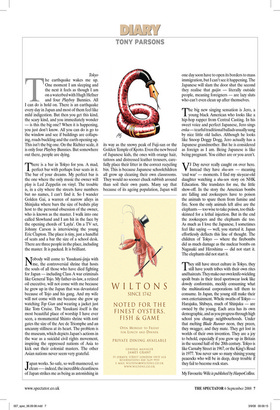Tokyo T he earthquake wakes me up. One moment I am
sleeping and the next it feels as though I am on a waterbed with Hugh Hefner and four Playboy Bunnies. All I can do is hold on. There is an earthquake every day in Japan and most of them feel like mild indigestion. But then you get this kind, the scary kind, and you immediately wonder — is this the big one? When it is happening, you just don’t know. All you can do is go to the window and see if buildings are collapsing, roads buckling and the earth opening up. This isn’t the big one. On the Richter scale, it is only four Playboy Bunnies. But somewhere out there, people are dying.
There is a bar in Tokyo for you. A mad, perfect bar with perhaps four seats in it. The bar of your dreams. My perfect bar is the one where the only music the owner will play is Led Zeppelin on vinyl. The trouble is, in a city where the streets have numbers but no names, I can’t find it. So I wander Golden Gai, a warren of narrow alleys in Shinjuku where bars the size of bedsits play host to the personal obsession of the owner, who is known as the master. I walk into one called Slowhand and I am hit in the face by the opening chords of ‘Layla’. On a TV set, Johnny Carson is interviewing the young Eric Clapton. The place is tiny, just a handful of seats and a bar the size of a school desk. There are three people in the place, including the master. It is packed. It is brilliant.
Nobody will come to Yasukuni-jinja with me, the controversial shrine that hosts the souls of all those who have died fighting for Japan — including Class A war criminals like General Tojo. My father-in-law, a retired oil executive, will not come with me because he grew up in the Japan that was devastated because of Tojo and his gang. And my wife will not come with me because she grew up watching Top Gun and wearing a jacket just like Tom Cruise. The Yasukuni itself is the most beautiful place of worship I have ever seen, a monumental Shinto shrine with torii gates the size of the Arc de Triomphe and an uncanny stillness at its heart. The problem is the museum, which depicts Japan’s actions in the war as a suicidal civil rights movement, inspiring the oppressed nations of Asia to kick out their colonial masters. The other Asian nations never seem very grateful.
Japan works. So safe, so well-mannered, so clean –— indeed, the incredible cleanliness of Japan strikes me as being as astonishing in its way as the snowy peak of Fuji-san or the Golden Temple of Kyoto. Even the new breed of Japanese kids, the ones with orange hair, tattoos and distressed leather trousers, carefully place their litter in the correct recycling bin. This is because Japanese schoolchildren all grow up cleaning their own classrooms. They would no sooner chuck rubbish around than soil their own pants. Many say that because of its ageing population, Japan will one day soon have to open its borders to mass immigration, but I can’t see it happening. The Japanese will slam the door shut the second they realise that gaijin — literally outside people, meaning foreigners — are lazy sluts who can’t even clean up after themselves.
The big new singing sensation is Jero, a young black American who looks like a hip-hop rapper from Central Casting. In his sweet voice and perfect Japanese, Jero sings enka — tearful traditional ballads usually sung by nice little old ladies. Although he looks like Snoop Doggy Dogg, Jero actually has a Japanese grandmother. But he is considered as foreign as I am. Being Japanese is like being pregnant. You either are or you aren’t.
VJ Day never really caught on over here. Instead they have shu-sen — meaning ‘end war’ — moments. I find my six-year-old daughter watching a shu-sen story on NHK Education. She translates for me, the little 05 show-off. In the story the American bombs are falling and zookeepers have to poison the animals to spare them from famine and fire. Soon the only animals left alive are the elephants — too wise to take poison, too thickskinned for a lethal injection. But in the end the zookeepers and the elephants die too. As much as I love the Japanese, I sometimes feel like saying — well, you started it. Japan effortlessly deflects this line of thought. The children of Tokyo — where the firebombs did as much damage as the nuclear bombs on Nagasaki and Hiroshima — did not start it. The elephants did not start it.
They still have street culture in Tokyo, they still have youth tribes with their own rites and haircuts. They make our own knife-wielding spoilt brats in their tired sportswear look like dowdy conformists, meekly consuming what the multinational corporations tell them to consume. In Japan, the young still make their own entertainment. Whole swaths of Tokyo — Harajuku, Shibuya, much of Shinjuku — are owned by the young. Each area has its own demographic, and as you progress through high school you change neighbourhoods. Under that melting Blade Runner neon, they preen, they swagger, and they mate. They get lost in worlds of their own invention. They are a joy to behold, especially if you grew up in Britain in the second half of the 20th century. Tokyo is like Carnaby Street in 1967, or the King’s Road in 1977. You never saw so many shining young peacocks who will be in deep, deep trouble if they fail to become rock stars.
My Favourite Wife is published by HarperCollins.


































































 Previous page
Previous page